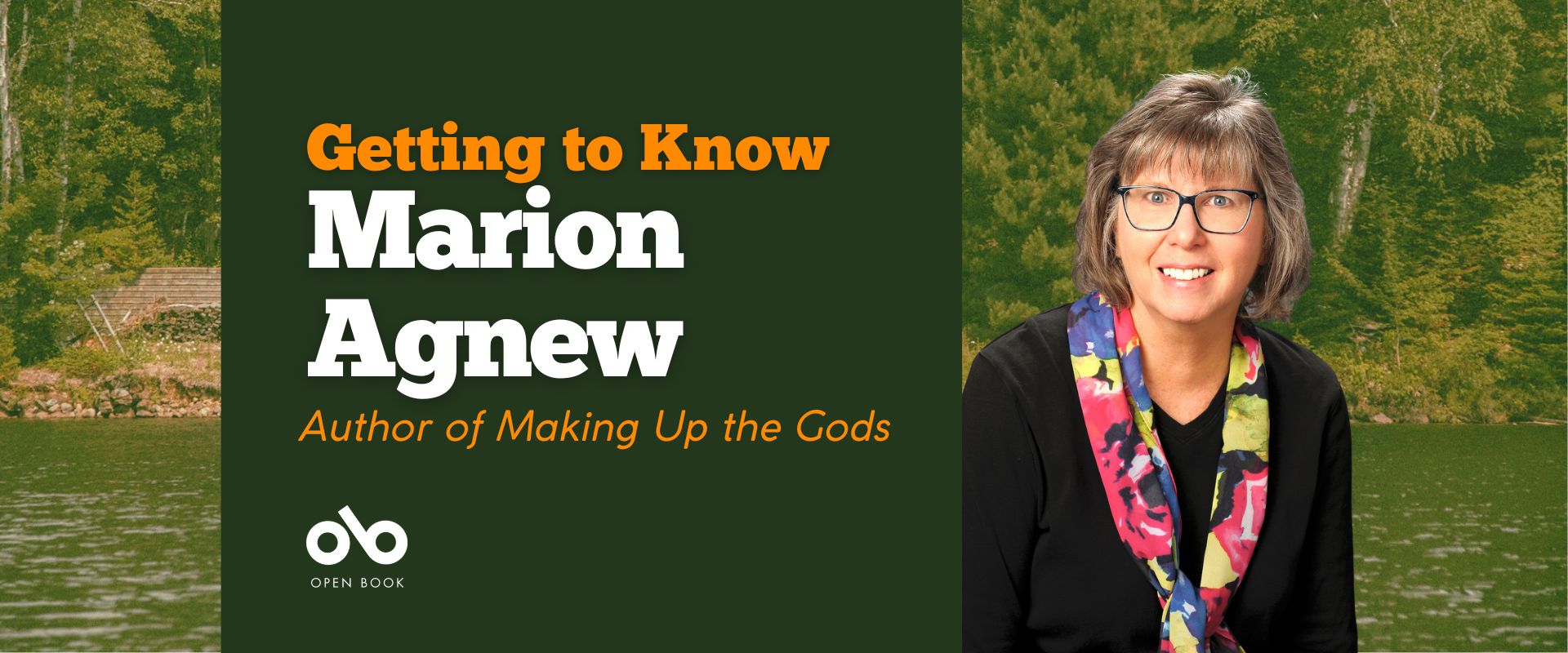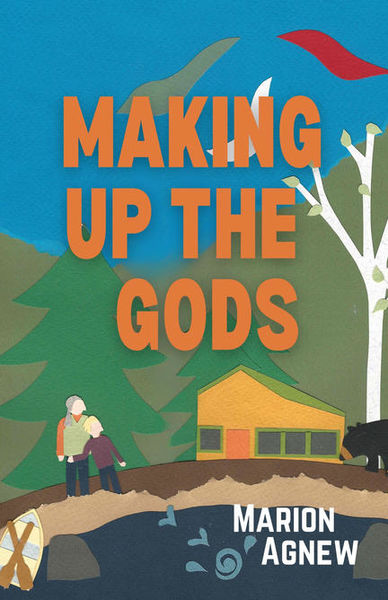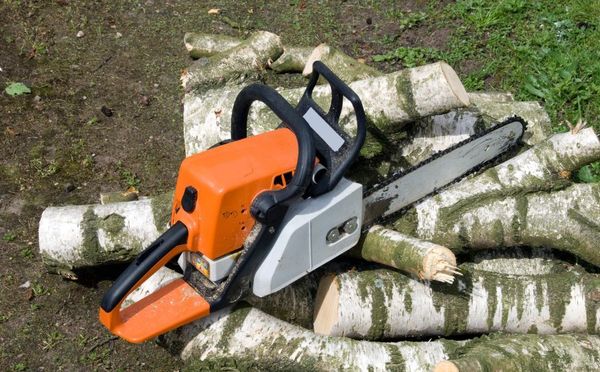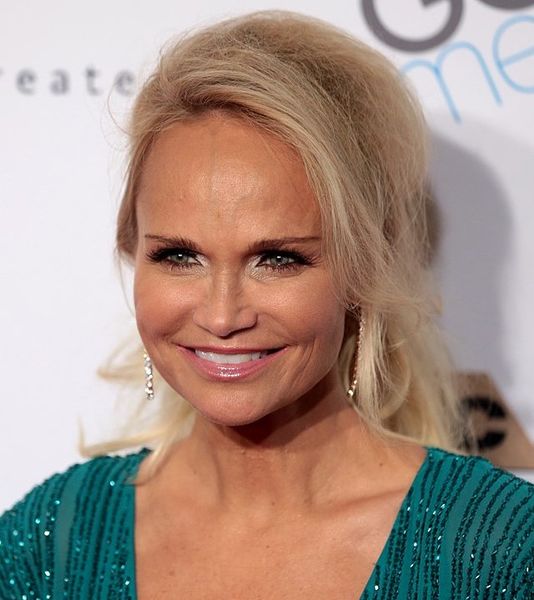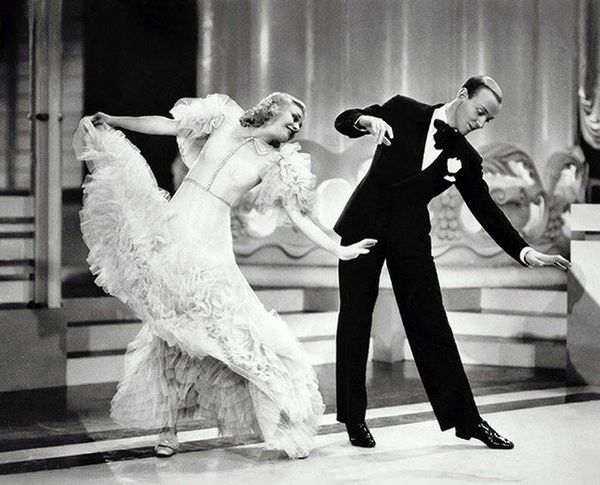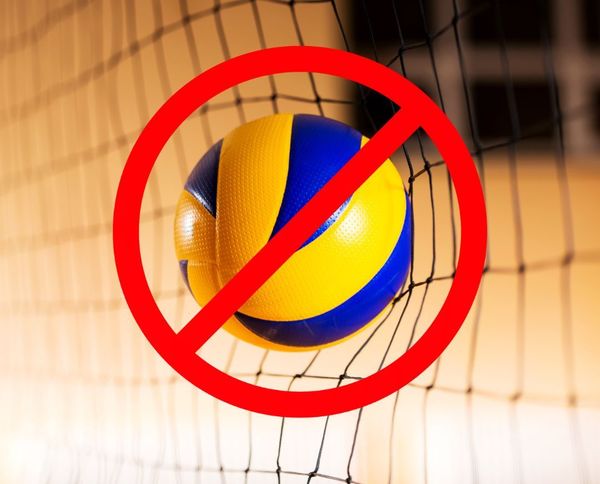Getting to Know Marion Agnew, Author of the Witty & Poignant New Novel Making Up the Gods
Simone, a widow, lives a quiet life in her cottage by a lake – until one day, when a man named Martin shows up on her doorstep, claiming to be a cousin. He is potentially Simone's only living relative, a link to a family—and a feeling—she thought was lost.
So opens Making Up the Gods (Latitude 46 Publishing), a witty and nuanced novel by Pushcart Prize- and National Magazine Award-nominated writer Marion Agnew. Agnew's insight into the human heart is on display throughout Making Up the Gods, and her smart, taut prose whisks readers along, as Martin reveals what has prompted his visit: a request to buy Simone's modest cottage, offering a shiny Florida condo as part of the possibly too-good-to-be-true deal.
As Simone ponders Martin's offer and his motives, she considers her obligation and ties to her community, in particular her recent offer to watch over a friend's nine-year-old son, Chen, who has lost his father in a harrowing accident, so that his grieving mother can briefly recharge. When Martin discovers Chen is the main thing keeping Simone tied to her home, Simone becomes concerned about just how far Martin will go to accomplish what he arrived at her door to do.
In a novel by turns funny and moving, Agnew explores questions about the pull of the past, what we owe each other, and when, if, and how to move on through loss and stasis. We were excited to get the know the writer behind this absorbing story, so we asked Marion to take on our Dirty Dozen challenge, where writers share 12 unexpected facts about themselves.
She revealed her surprising (and powerful) favourite possession, the musical connection that inspired her name choice for Chen, and what she's learned about her writing practice over many years of dedicating time to it.
The Dirty Dozen with Marion Agnew:
1. Early in the pandemic—the first Monday of lockdown in Canada, March 16, 2020—I fell on ice in our driveway and broke both wrists. Because we knew little about the virus in those days, I eschewed the hospital and splinted my wrists myself at home with cardboard tied on using dish towels. Frozen peas served as excellent ice packs. With the benefit of hindsight, I might choose differently, but I was lucky. Two months later, an orthopaedic surgeon said they were healing fine and he wouldn’t have performed surgery anyway. These were my first (and only, so far) broken bones.
2. In a recent question-and-answer session, I was asked what my favourite possession was. I was stuck for a moment until one of my friends softly said, “chainsaw?” She was right! I adore my twelve-inch battery-powered chainsaw. We live in the country, where it’s handy for clearing the driveway when trees come down in the winter.
3. One of my peak experiences, decades ago, was playing (oboe) in a pit orchestra for a production of OKLAHOMA in Colorado. The musical’s story is hugely problematic in several ways (complete erasure of Indigenous peoples in Oklahoma, and shaming “girls” who “cain’t say no,” for starters), but the phrasing and harmonies are a pleasure to play. They just make sense, somehow.
4. My debut novel, Making Up the Gods, includes a boy named Chenoweth, Chen for short. He’s named for Kristin Chenoweth, whose version of “Taylor the Latte Boy” kicked off the playlist I wrote to for several years. Kristin and I were both born in Oklahoma. That’s probably everything we have in common, though I do admire her talent.
5. I have a soft spot for stories written by women in the mid-20th century, stories that might have been popular then but have been overlooked or forgotten since. In the US, Rose Franken wrote a whole series of books between 1939 and 1959 that featured the maturation of Claudia, a child bride. In 1939, the UK’s Jan Strother gave us two years in the life of the intelligent and observant upper-middle-class Mrs. Miniver (part of which I used for the epigraph of my novel). And Barbara Pym, whose early work about interesting and “excellent” women drew acclaim, unfortunately had a fifteen-year spell in which publishers weren’t interested in her work.
Your CanLit News
Subscribe to Open Book’s newsletter to get local book events, literary content, writing tips, and more in your inbox
6. Another soft spot: Hollywood musicals of the 1930s, 1940s, and 1950s. Fred Astaire, Ginger Rogers, Eleanor Powell, Judy Garland, Gene Kelly, Debbie Reynolds, Bing Crosby. Lyrics to some of the verses surface at odd times. They’re great company.
7. Twice a year, I’m surprised that the thermometer gives data but not information—5 degrees Celsius feels so cool in October and so warm in April. People often talk about the coziness of a fire in autumn or winter, but there’s something fantastic about that first day, maybe in April, when you can finally leave your house without zipping your coat.
8. A surprise: when I first worked from home as a freelance writer, I was shocked by how the household consumption of paper products—toilet paper, facial tissues—increased, along with snacks and other food. I didn’t use or eat more; I was just responsible for buying it all.
9. Unpopular opinion: volleyball is not fun. It’s great for people who want to play seriously. But batting a ball around as a youth group activity, or maybe at picnic or at the beach? No, thank you. Same with bowling. Not my cuppa.
10. As a not-very-competitive swimmer for twenty years, I learned a little about the concept of “practice.” Most days, swimming meant a workout of some kind in the water or weight room, prescribed by a coach who was trying to train me to swim faster. Periodically we’d race. But most of the time, “competitive swimming” meant “follow the black line on the pool bottom, turn, repeat.” I quit at about age 30 and don’t really miss either the competing or the practicing.
11. It’s taken me fifteen years to gradually apply that slight understanding of “practice” to writing. When I first met artists, I didn’t know that “What’s your practice?” was a way to ask, “Do you write, dance, draw, or something else?” I now understand that practicing art—for me, writing something—most days is a good way to get better at it. And I, at least, can always get better.
12. The unpaved driveway to our summer camp curves around a cliff. For decades—as long as I can remember—a granite boulder the size of a compact car has perched precariously on an outcrop. When I walk past, I often think, “How has it not fallen?” and wonder if this moment, while I’m walking past, is when it will let go.
You can get to know Marion further by picking up Making Up the Gods
_________________________________________________________________
Marion Agnew is the author of a personal essay collection, Reverberations: A Daughter’s Meditations on Alzheimer’s (Signature Editions, 2019). It was shortlisted for the Louise de Kiriline Lawrence award for nonfiction. Her essays have been nominated for a Pushcart Prize and a National Magazine Award. She lives in Shuniah, Ontario, mere yards from Lake Superior, on Anishinaabe/ Robinson-Superior Treaty territory.
